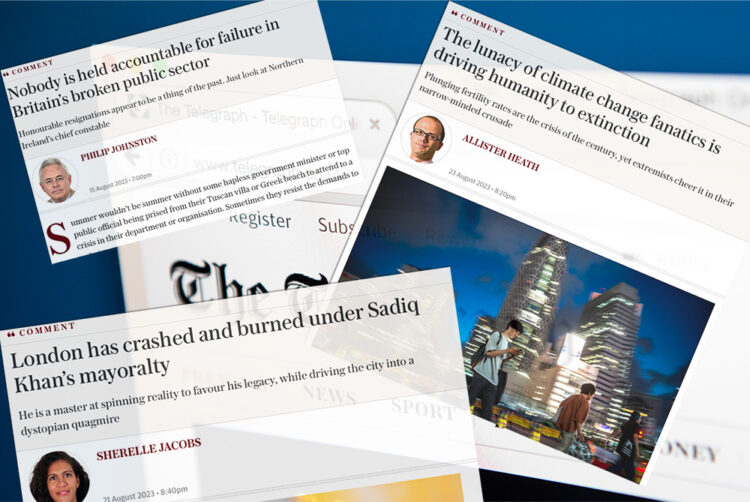Why you should probably read The Daily Telegraph

Opinion
In an increasingly polarised media landscape, we must read widely, question everything, and don’t lose perspective on what really matters.
It is said that travel broadens the mind and distance lends enchantment, and some time spent travelling through France does both for me, even if it’s through rosé-tinted spectacles.
French travel is a delight with great roads and plentiful, relatively pleasant service stations. The trains are frequent, fast, comfortable and affordable with well-trained staff.
And then I came home.
But time spent in a different environment watching people going about their daily lives (albeit many on holiday) is a useful corrective to the hysteria that we live with daily. Unfortunately, this hysteria largely exists, and is often confined to, our media channels.
We have become far too accustomed to thinking that the real world cares about the latest headlines. Some of us may be a little too obsessive about new news (guilty as charged), fed by an hourly diet of increasingly surreal media content.
For example, I departed the UK following an apparent three-month obsession with Phillip Schofield, Huw Edwards and more recently (and less well-reported) Dan Wootton, three media personalities who have attracted controversy for different reasons. The level of coverage by the very media in which these personalities plied their trade was insane at a time when there is war in Europe, people are struggling to make basic ends meet, democracy is potentially being subverted, and the world enters a new era in East/West relations.
Those of us who are involved in the media business may mistake some of the stories behind the headlines as being in or of the public interest, but the people on our local bus don’t seem so bothered.
Yet the headlines are the point. So much of our media is clickbait now that we all fall for it.
Culture war churn
This especially applies to what people call the ‘culture war’, which dominates our media channels and in which I am a conscientious objector. It seems to be a war that no-one can win as the two sides trade blows; none of the participants can persuade the other, so time spent trying to do so is a gargantuan waste of time and effort, much like a lot of social media commentary. But it attracts ad revenue like nothing else, so real stories that matter are relegated.
The ‘culture war’ represents a huge amount of the content churned out daily to fulfil the goal of monetisable traffic, and it simply perpetuates the oft-discussed echo chambers that much of our media have become. A reliance on page traffic that can be sold leads to a vicious spiral of lurid content.
For example, the typical Daily Express reader laps up ever more egregious stories about immigration, the most recent claim being that France is deliberately facilitating small boats crossing the Channel as a punishment for Brexit, while the UK pays them handsomely for doing so.
Another example is the Daily Telegraph, which I read daily. Some may see this as a form of sado-masochism, and as a Fulham supporter, I am used to self-inflicted misery, especially after just being thumped by our local rivals.
The Telegraph is not for the faint-hearted. Some of its writers produce columns that border on the unhinged side, as evidenced by a recent article by Allister Heath, titled “Fury of the silent majority is driving a global Right-wing counter-revolution”, wherein he argues that there is a worldwide backlash against the ‘woke ruling elite’ (even though the populist movement evident in many countries has many different root causes, especially outside of the West where ‘wokeness’ is absent).
An ad industry of ‘aunt Sallys’
Such articles predict the death of the West and its cultures and values, and describe in apocalyptic terms how the world is being taken over by shadowy global forces that are replacing the traditional bedrock of society. ‘Wokeness’ is invariably blamed rather than the inequality that has taken hold since the 2008 crash. If there is a nationalistic backlash, it should really be apportioned to the kind of free-market system the Telegraph supports.
This week saw the following headline from an op-ed by Sherelle Jacobs: “Eco-maniac Sadiq Khan is driving London into a dystopian quagmire”.
Interestingly, the following morning this had become: “London has crashed and burned under Sadiq Khan’s mayoralty”.
Presumably, the original take was simply not strident enough — London has to have already been ruined, much to the surprise of anyone who actually lives or works in the Capital. Maybe the algorithms are at play or the sub-editors were responding to reader comments.
And it’s the reader comments under most articles that are really breathtaking. Needless to say, those Telegraph readers who bother to post (a minority) are incandescent with rage about the usual subjects.
They are furious and fearful about immigration and can’t understand why the Royal Navy hasn’t simply attacked the small boats (I exaggerate, but not much).
They abhor woke-ness, high taxation and the EU, being delighted about Brexit even if they can’t articulate its benefits beyond the supposed increase in sovereignty. They detest the current Conservative government, calling it ‘Marxist’ and worse.
They are very anti-BBC and believe that it should be defunded and many claim (probably falsely) to have abandoned the BBC years ago, thereby depriving themselves of much of the best TV, Radio and Web content.
And, increasingly, they are incensed by advertising that includes Black, mixed-race and LGBTQIA families.
The advertising industry has become one of the Aunt Sallys of the anti-‘woke’ brigade, with our industry now attracting the hatred of a section of the public.
We need media to help us understand the world as it really is
So, why should I or anyone else read The Telegraph?
Once upon a time, we could find informed debate in our media, with facts and different perspectives dissecting complex topics. We could form a view based on balanced coverage. But those days are over. We now need to mix our media menus from increasingly polarised sources, led by clickbait and responsive to reader comments, however crazy.
There isn’t much in the middle ground, and simplicity has replaced complexity and nuance, leading to the kind of shouty clickbait that dominates.
And for media planners, or even non-combatant observers like me, understanding the world is crucial, and broadening the mind should be a permanent way of life.
We need to avoid groupthink and understand people’s attitudes, especially outside of the wealthier, younger and more progressive urban centres. While we may not share the views of the readers of such titles, they are entitled to them. They are older and more traditional and find the changed world confusing and infuriating. They are part of the audience, and we shouldn’t disregard them.
I see my daily Telegraph consumption as part of a balanced diet that helps me understand a different perspective, like a daily focus group among people who are very different, even if they are demographically similar. Nowadays attitude and behaviour trump demographics.
Deeper rabbit holes
Why does this matter so much now?
Ownership of the Telegraph group is up for grabs, and there is a chance that the winning bidder may be the Daily Mail‘s parent group or the ultimate owners of GB News. My ever-reliable fellow Media Leader columnist Raymond Snoddy hopes for a more moderate right-centred entity to emerge, but, in reality, any combination is likely to be even more extreme in its editorial stance, especially if unregulated by Ofcom.
Outrage produces revenue in the digital age, and the middle ground is noble but uncompetitive. Any of the proposed combinations will not be good news for us fans of reasoned debate and balance.
We could end up with an even more extreme version of The Telegraph, with an even greater reliance on bile to drive page traffic, perhaps a version of GB News that goes even further down its favourite rabbit holes in the pursuit of audience and revenues.
As the level of debate in UK media becomes increasingly polarised, the need for balance becomes greater, accompanied by manual control of the automated trading mechanisms that reward the most sensational headlines.
So the best reason of all for reading The Telegraph is to remain vigilant of the consequences of the partisanship of most media properties, especially if it gets worse, and to recognise that the hysteria peddled by the media should be tempered by common sense, and we shouldn’t lose perspective on what really matters.
 Nick Manning is the co-founder of Manning Gottlieb Media (now MGOMD) and was CSO at Ebiquity for over a decade. He now owns a mentoring business, Encyclomedia, offering strategic advice to companies in the media and advertising industry, and is non-executive chair of Media Marketing Compliance. He writes for The Media Leader each month.
Nick Manning is the co-founder of Manning Gottlieb Media (now MGOMD) and was CSO at Ebiquity for over a decade. He now owns a mentoring business, Encyclomedia, offering strategic advice to companies in the media and advertising industry, and is non-executive chair of Media Marketing Compliance. He writes for The Media Leader each month.




